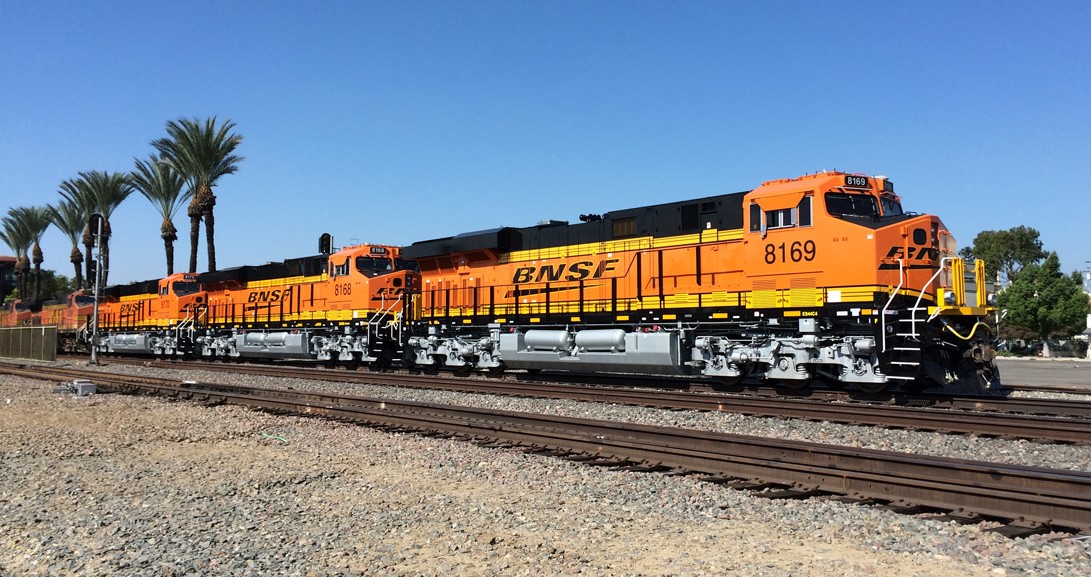



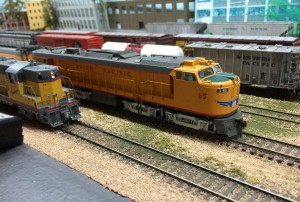
One of the things I’ve noticed in my duration in California is that the way housing is set up out here (no basements, very expensive and close together) is that most modelers come together and form a club and have a club layout. If anyone checked out the link I provided in the last newsletter for the California Southern Model Railroad, you can get an idea on what I mean. With multiple clubs in the greater Los Angeles area, there are plenty to visit and potentially get a chance to run your equipment on if you know the right person. I’m finding out that if you know the right person out here you can manage a lot of perks in this community.
Well, it wasn’t long after joining the Norwalk club that one of the members there, and co-worker, said that there was an extra spot to go run at the La Mesa club down in San Diego. I had head numerous people talk about La Mesa, but I really didn’t have a clue as to what it was that made as great as everyone made it sound. Well, curiosity got the better of me and I asked. The response wasn’t rude, just shocked; “You haven’t heard of La Mesa!?” No guys, I haven’t. Club layouts aren’t really a thing where I come from!
I was quickly informed that La Mesa is a huge layout located in the San Diego Model Railroad Museum. The layout represents the joint Southern Pacific/Santa Fe railroad from Bakersfield to Mojave, California of the 1950’s. And yes, it does contain the Tehachapi Loop.
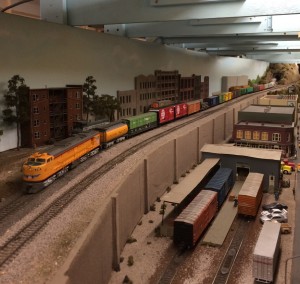
I now know why members of the Norwalk Club were always testing a train to head down to San Diego. The La Mesa layout is really one giant hill climb staring at Mojave. I now know why members are sticklers about having metal couplers on you freight cars, other than for looks. I now know why members are always checking and scrutinizing their equipment to make sure wheels are in gauge and couplers are all the same and correct height. I also know why members are making sure the electronics in their locomotives are in proper working order. This is a tough layout. If your equipment does not pass inspection of the operator in charge that day, you will not be allowed track time. Some of the members at La Mesa are also so into the prototype that if it was never seen on the line, they will not allow it on the layout!
After hearing about what was necessary to be considered to run at La Mesa, I actually had second thoughts about accepting the invite. Everything I have has plastic couplers, namely freight cars. And I also haven’t gone through the rigorous testing I felt necessary to run on their layout. After voicing my concerns, I was informed that getting an invite to run at La Mesa was actually not an everyday occurrence, and if turned down, it is even harder to get a second invite. So, I had to come up with a train to begin testing!
I had just gotten a DCC decoder and installed in one of my UP Veranda Turbines. I had been running this at Norwalk and was very, very pleased with its performance. So I figured what the heck. I’ll give it a shot. Unfortunately, if anyone else has one of these you will agree, the turbine does not pull anything close to what one would think these locomotives could pull. Part of the problem is that only 2 of the 4 trucks are used for traction. The other issue? Although the Turbine had a nice weight to it, it is the twin bolster truck design that does not allow great traction. So, sadly, this locomotive is light footed when it comes to NMRA standard weighted cars and hills.
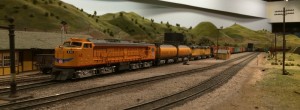
Another bit you may be wondering about is how I was able to run a turbine on the La Mesa layout if they don’t allow non-prototype equipment on the layout? Well, the good news is that the day I was running, the operator in charge was not a stickler. His train was 100% accurate to the layout, but he is a lot nicer to the invitees and what equipment they bring.
After finding 2 UP GP9s in the parts room at the office, I decided that would be my consist and I just won’t pull a very long train. After all, I was told that the passing sidings really only allow about 35 cars. So I began testing my consist at Norwalk with 40 cars. Even though the two GP9s are very light footed as well, they gave the Turbine the extra tractive effort needed to climb a 2% grade. Success!
Sunday, October 26th, the day I make it to San Diego. Most people would be sightseeing, eating at unique restaurants or just doing the all around “tourist” thing. Not me. I was at the San Diego Model Railroad Museum running trains. The co-worker I went with, Joe, started off by taking me around the whole layout. It’s big. Very big. Very impressive. And quite a bit of it is unfinished, which I was quite shocked at. I would have thought for a space in a Museum it would be a complete layout. But hey, this stuff takes time, especially if it’s all donated time. So I get it. The finished portions of the layout is mostly what is seen by the public, and the important parts are finished too; i.e. Tehachapi Loop.
The unfortunate part is that I didn’t take a whole lot of photos other than of my train. There is a lot going on while working this layout and you have to be alert. Most of it is single track, and if you haven’t checked for an opposing train, there is potential for a big problem. I was able to manage a few photos with my iPhone that turned out nice.
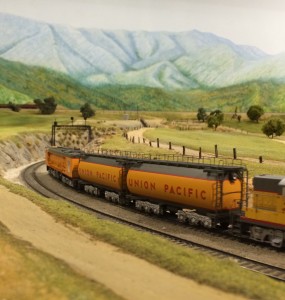
The museum is open on Sundays from 11-5, and in this time I only managed to get around the layout almost 2 complete times. Remember how I said it was big? Now, there was a lunch break in there which maybe would have gotten me around 2 complete times, but who’s counting?
All in all, I think it went very well. I had no major issues, although my Turbine and tender wheel sets are out of gauge for their hand laid track and I need to work on the speed matching a little more. But, having no issues and not causing any issues looks good to the person invited me, so I think I stand a chance of returning. And, should anyone come out for a visit, the layouts at this museum will definitely be worth a trip.
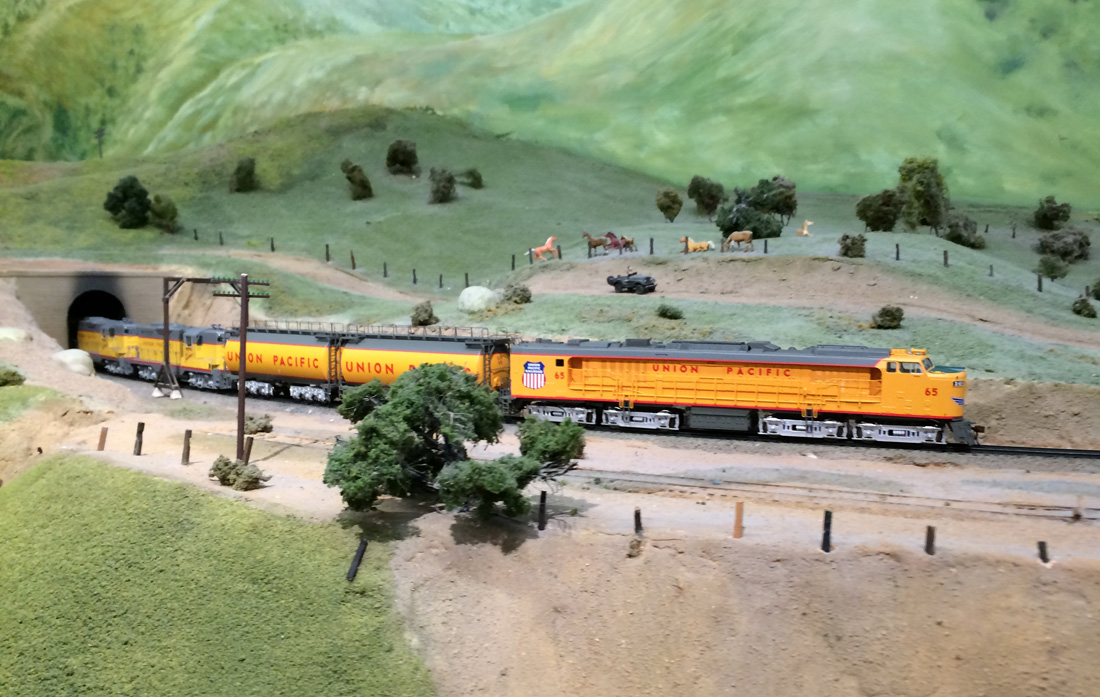
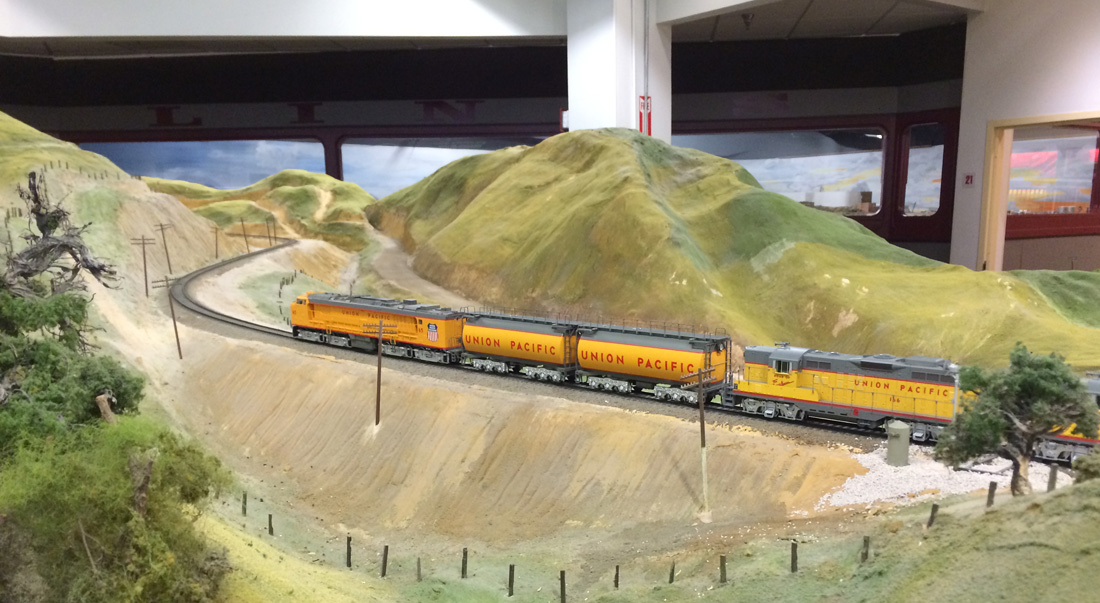
Submitted by Rick Bivins
…from Kentuckians for Better Transportation (KBT)
On October 9, GoRail and KBT, together with KBT Member R.J. Corman, participated in a “cracker barrel session” about the economic benefits of freight rail at the Kentucky League of Cities annual conference in Louisville at the Galt House Hotel and Convention Center.
More than 25 years ago, ground was broken on a 1,300-acre tract of farmland in Scott County. The spot is now home to KBT Member Toyota Motor Manufacturing Kentucky (TMMK), Toyota’s largest manufacturing facility outside of Japan, with nearly 7,000 employees. The location of TMMK has helped shape Kentucky’s automotive industry landscape into the powerhouse that it is today. Scott County was chosen because of its access to freight rail. In addition, Toyota has about 100 automotive suppliers in Kentucky alone, which employ over 9,600 workers dedicated to producing parts for Toyota vehicles.
Toyota continues to expand this facility, creating even more new jobs in Kentucky. In 2013, TMMK announced a significant upgrade at the facility with plans to invest $530 million and create 750 new jobs. This is just one example how freight rail helps create jobs in Kentucky, a state that is fortunate to have 2,600 miles of freight rail lines moving everything from cars to coal.
America’s privately owned freight railroads have invested more than $550 billion of their own funds – not taxpayer dollars – back into the rail network since 1980, including $26 billion this year alone. These infusions of private capital have made the US rail system the safest, most productive and efficient freight rail network in the world.
GoRail helps spread the word about the importance of a strong and growing freight rail system to the broader economy and to businesses and communities large and small in Kentucky and nationwide.
With freight volumes continuing to rise as the economy picks up steam, rail will have an event larger role to play, including accommodating growth in Kentucky’s automotive industry, safely delivering energy supplies and continuing to support economic growth in the Commonwealth.
 And welcome to November, 2014….traditionally our elections of officers month. Steve Miller kindly nominated Yours Truly for Chapter President, which caught me off guard. I accepted with reservations. I served as Chapter President for three years and enjoyed it very much. I was, however, relieved when Tom Johnson accepted the nomination last year. Not wanting to act in haste I as said, accepted. Now having had a few weeks to give it some thought, I withdraw my acceptance.
And welcome to November, 2014….traditionally our elections of officers month. Steve Miller kindly nominated Yours Truly for Chapter President, which caught me off guard. I accepted with reservations. I served as Chapter President for three years and enjoyed it very much. I was, however, relieved when Tom Johnson accepted the nomination last year. Not wanting to act in haste I as said, accepted. Now having had a few weeks to give it some thought, I withdraw my acceptance.
Last September, while enjoying the Chapter Pic-Nic in Crofton, I went to Bill Farrell with the idea that he accepts a nomination for Chapter President. He was very receptive to the idea and as I have learned, he has some great ideas. And I like change once in a while, thinking said change is productive.
So, I humbly ask the Chapter Membership accept my withdrawal from the Chapter Presidential Race! And, let us all grow our Chapter.
Rick Bivins
|
Tom’s DVD of the Month Review |
|
| Title | Across Arizona BNSF’s Arizona Mainline Part 1 |
| Producer | 7idea Productions |
| Format | DVD Wide Screen |
| Playing Time | 1 hr 48 min |
| Purchased From | Trainvideodepot.com |
| Date Purchased | 6/25/14 |
| Price Paid | $27.95 |
This video was shot in April and May of 2014 and covers 200 miles of the Seligman Sub of the BNSF mainline. We travel eastward from Needles, CA, to Williams Junction, AZ.
A very good three dimensional map is included near the beginning of the video so that the viewer gets a clear picture of the route he will travel and the topography that will be encountered along the way. The low point on the Seligman is 456’ above sea level at the east end of Topock, just east of the Colorado River which is the boundary between California and Arizona. The right of way reaches to 7300’ above sea level just west of Flagstaff but our tour stops short of that in Part 1.
We are treated to some triple track action at Needles with a train on each track.
The wide screen format, excellent image quality, beautiful desert scenery, and good train action make this a very good video.
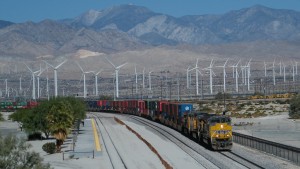
It wasn’t too long after I arrived in California and became acquainted with the local railfan community that I began wondering when, and if, any railfan trips would happen like I began to enjoy so much back in the Midwest. The trips to Gorham, IL., Princeton, IN., and handfuls of other places really became something I looked forward to doing with fellow Chapter members. So you can believe I was curious if it would be the same out here.
Well, it took a little time and getting to know some of these people better, but it finally happened. A co-worker, Craig, asked if I wanted to join him and a friend/railfan/photographer to make a trip east to Colton Yard, San Bernardino, San Timoteo and Beaumont Pass. In my mind, I was asking if he really had to ask, but decided a simple “yes” would be a better answer.
At first, I was rather curious as to why Craig decided to go railfanning on a Sunday of all days. My experience with Sunday train watching is a lot of sitting and waiting with not many trains. But I was quickly reminded that this is Southern California; trains originate all day, every day.
Our first stop was at the Pepper St. over pass on the East end of UP’s West Colton Yard. This was mostly to see if anything interesting was originating and heading east that we could catch going through Beaumont Pass. This stop also provided to be a little bit of a downer. Reason why is because there was a very heavy marine layer that moved in off the Pacific overnight and didn’t appear to be moving out anytime soon. Cloud cover? In Southern California? Yes, I was just as shocked as you!
So, after two westbound trains passed under Pepper St., we finally saw an originating train leaving the yard to head east. The best part was it had an oddball locomotive in consist, a GMTX GP38-2 from GATX locomotive leasing. This gave reason to head east without further question. As I mentioned in my last article, foreign power is a rarity in this part of California so the railfans give chase to anything out of the ordinary. (Head north to Mojave and Tehachapi and you can see foreign power all day long…)
We went to the furthest point east that we would reach all day which was Palm Springs, at the foot of San Gorgonio Pass. What I couldn’t get over was the sheer amount of wind that was blowing through this area. Definitely not a spot for shooting video without expensive sound equipment to prevent the sound of the wind on the footage.
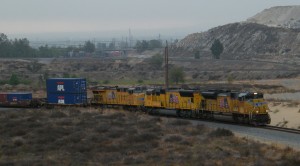
We knew that we were ahead of the GMTX locomotive, but still knew that this was a good spot to wait for any train. Since Craig and our fellow railfan, Charles, are skilled photographers, they were very conscious of the suns position throughout the day. This spot proved to be a little tricky, but I feel the photo turned out well. But once again, I am happy with a lot less in my photography. I’m sure time around these guys will make me become a lot harder on my shots.
Due to the wind, and not having a safe place to shoot photos from, we headed west back towards Beaumont. On the way, we noticed that a rock train had left the quarry in Cabazon, so we headed in to Beaumont to look for a spot in which the sun, getting higher all the time, might be half-way decent. We finally found a spot at Hinda, in western Beaumont, which has a fairly new highway overpass. This spot proves that if I continue to do this, I need to invest in a different camera. But the shots turned out ok.
After lunch, we continued west to an area called Redlands. This was my favorite spot of the whole day. Double track main line (in this area anyway), brilliantly clear skies, and being in the middle of an orange grove was really pretty cool. The only down side was that we must have hit a lull in UP traffic as there weren’t too many trains. But, we waited around for a bit and managed to catch a few. I must say that I will be frequenting this area a lot I think.
After we caught a few trains through Redlands, we got word that a brand new UP GEVO would be rolling into Colton Yard before too long. New power is treated the same as foreign power or even Heritage units out here, so we quickly made our way back in hopes to watch it come down the cut off from Cajon Pass and into the yard.
We stuck around and chatted with a few other railfans that Craig and Charles know, watched a few more trains, and decided it was time to call it a day. It was 4:30 pm by this point and since Craig and I left Orange CA at 6am, we were starting to get tired. So as we are going to drop Charles off, we notice a train heading west towards Colton Yard, thinking its just another stack train. But no! As luck would have it, this was a train carrying nothing but wind turbine components! We quickly turned around to go back to the Pepper Street overpass, but as soon as we get there, this train takes the cut off to make its way towards Cajon Pass. So back in the car we go to give chase.
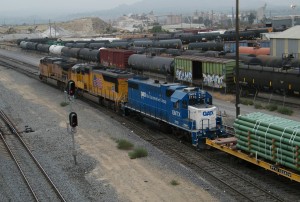
By this time, light was becoming a larg factor. The sun was setting and shadows were being cast giving us less than optimal conditions. Luckily Craig knew a few places that would yield some shots.
After we got these, I made the suggestion we head up Cajon Blvd and try to catch it one last time before we lost all daylight. Plus, there would be a chance to see BNSF trains making their way up and down Cajon Blvd, so it wouldn’t be all for nothing. Honestly, it was kind of nice seeing some BNSF as compared to nothing but Armour Yellow all day!
After hanging out at the top of Cajon Blvd while the windmill train waited on a few south/west bound trains, the sun had tucked in behind the mountains and any opportunities were lost to get it in good light. So we headed back down towards San Bernardino. But, lo and behold there were two unique locomotives at a grain elevator along the highway. Two BNSF PR30C locomotives. I had never heard of these before, and honestly, I think they are really neat looking locomotives.
The small story behind these locomotives is that EMD was so confident that UP would end up buying these units that they painted the demonstrators in UP colors just short of having them lettered for UP. But, you guessed it, UP didn’t buy them! BNSF actually bought a few, including the two that are in UP colors, which are the two we saw. They have four or six more in BNSF paint.
With the sun having completely set, it was finally time to end our day and head back to the city. I for one am very happy I went, plus I learned a fair amount for the next time I go out to shoot photos. All in all, a great day and I can’t wait to do it again and to go to new locations!
|
Tommy Johnson’s DVD of the Month Review |
|
| Title | Denver & Rio Grande Western |
| Producer | Pentrex |
| Format | DVD |
| Playing Time | 1 hr 52 min |
| Purchased From | Railfan Depot |
| Date Purchased | 12/20/2009 |
| Price Paid | $23.74 |
This is one of my favorite DVDs in my collection of over 150 RR videos. I admit to being biased by my affection for the Denver & Rio Grande Western RR and for the beauty along the route from Denver to Salt Lake City. I rode that route in 1960 on the California Zephyr when I was just eleven years old. That experience left impressions on me that remain to this day. Also covered in this video are the routes from Denver to Pueblo and from Minturn over the Tennessee Pass to Pueblo.
The filming took place in 1986 while the Denver & Rio Grande Western was still an independent railroad and the freight trains were pulled by locomotives proudly wearing the D&RGW badging.
We see the Amtrak California Zephyr climb the grade up the Front Range of the Rockies and then watch a freight train pass though the six mile long Moffat Tunnel at the Continental Divide.
Next up is a cab ride through Gore Canyon, a narrow, rugged canyon with the Colorado River white water rapids running through it. The scenery in Gore Canyon is spectacular.
The chapter devoted to the route from Minturn eastward to Pueblo contains some exciting railroad action against the backdrop of golden aspen leaves shining in the sun on the mountain slopes. Helper locomotives are added to trains at Minturn before they tackle the grade to Tennessee Pass.
There is no mention of helpers until they are cut loose at the summit of Tennessee Pass and sent back down to Minturn. One of the shortcomings of this video is the shortage of narration. We are told very little about the trains we are viewing as far as their origin, their cargo, their destination, or the types of locomotives being used.
It was disappointing how few scenes from Royal Gorge were included in the video. The trains on the Minturn to Pueblo route had to pass through Royal Gorge before arriving at Pueblo fifty miles to the east of the gorge.
There was no use of maps in this video and that is inexcusable. They show diagrams of the routes but they are only lines with dots on either end with the names of the locations printed next to them, no map features at all, not even the outline of the state boundary. If the viewer didn’t know beforehand that the subject matter was in Colorado, he would never know it from the video.
Despite the mentioned short comings, I still say this is one of my favorites. As good as it is, it could have been much better, though.